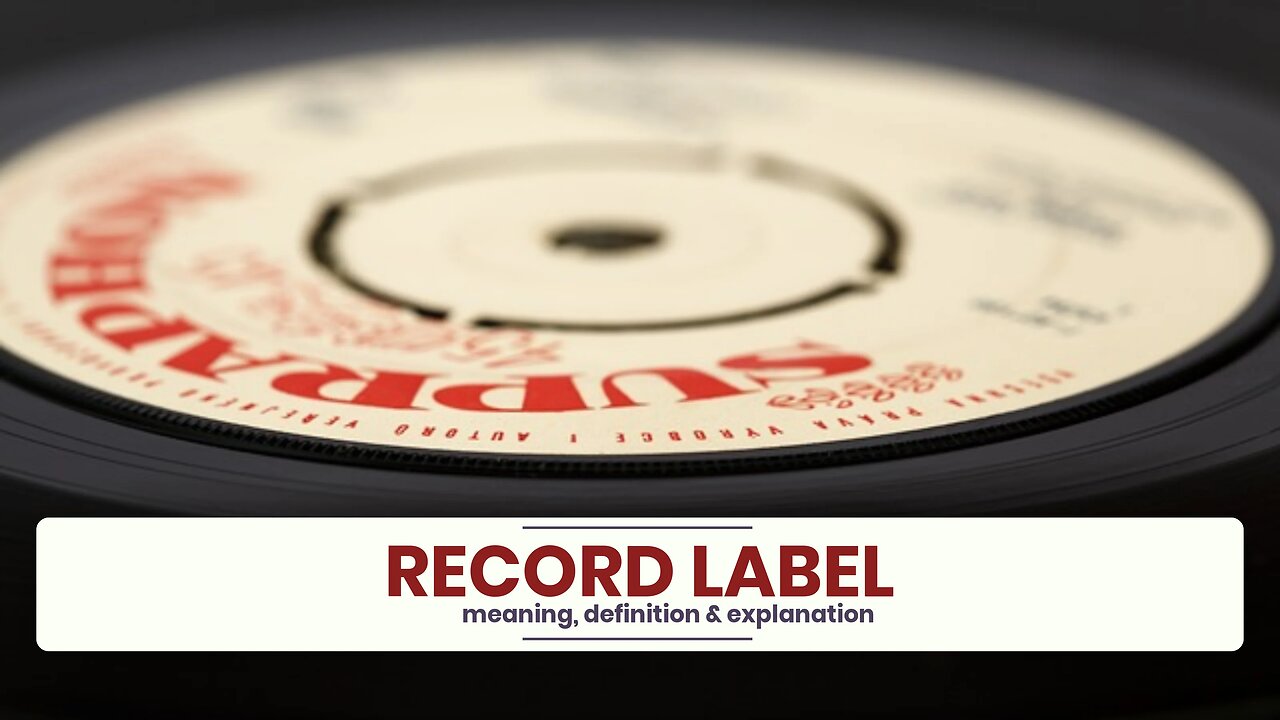Premium Only Content

What is RECORD LABEL?
✪✪✪✪✪
http://www.theaudiopedia.com
✪✪✪✪✪
What does RECORD LABEL mean? RECORD LABEL meaning - RECORD LABEL definition - RECORD LABEL explanation. What is the meaning of RECORD LABEL? What is the definition of RECORD LABEL? What does RECORD LABEL stand for? What is RECORD LABEL meaning? What is RECORD LABEL definition?
A record label is a brand or trademark associated with the marketing of music recordings and music videos. Often, a record label is also a publishing company that manages such brands and trademarks, coordinates the production, manufacture, distribution, marketing, promotion, and enforcement of copyright for sound recordings and music videos; conducts talent scouting and development of new artists ("artists and repertoire" or "A&R"); and maintains contracts with recording artists and their managers. The term "record label" derives from the circular label in the center of a vinyl record which prominently displays the manufacturer's name, along with other information.
Within the music industry, most recording artists have become increasingly reliant upon record labels to broaden their consumer base, market their albums, and be both promoted and heard on music streaming services, radio, and television, with publicists that assist performers in positive media reports to market their merchandise, and make it available via stores and other media outlets. The Internet has increasingly been a way that some artists avoid costs and gain new audiences, as well as the use of videos in some cases, to sell their products. The music industry has changed remarkably over the past decade due to the decline in album sales and free content available online. This has caused record labels to find new avenues of making profit with their artist and many turn to 360 deals. A 360 record deal means that the record label keeps nearly all the profit from an artist generated from album or digital sales, performances, merchandise, commercial ads, endorsements, etc. Many artist are starting to release themselves independently for this reason.
Record labels may be small, localized, and "independent" ("indie"), or they may be part of a large international media group, or somewhere in between. As of 2012 there are only three labels that can be referred to as "major labels" (Universal Music Group, Sony Music Entertainment and Warner Music Group). A "sublabel" is a label that is part of a larger record company but trades under a different name.
When a label is strictly a trademark or brand, not a company, then it is usually called an "imprint", a term used for the same concept in publishing. An imprint is sometimes marketed as being a "project", "unit", or "division" of a record label company, even though there is no legal business structure associated with the imprint.
Record companies and music publishers that are not under the control of the big three are generally considered to be independent (indie), even if they are large corporations with complex structures. The term indie label is sometimes used to refer to only those independent labels that adhere to independent criteria of corporate structure and size, and some consider an indie label to be almost any label that releases non-mainstream music, regardless of its corporate structure.
Independent labels are often considered more artist-friendly. Though they may have less financial clout, indie labels typically offer larger artist royalty with 50% profit-share agreement, aka 50-50 deal, not uncommon.
-
 1:52
1:52
The Audiopedia
8 months agoWhat is EXECUTIVE DIRECTOR?
531 -
 2:59:26
2:59:26
Twins Pod
7 hours agoEMERGENCY PODCAST WITH ANDREW TATE! - Twins Pod - Special Episode - Andrew Tate
72.4K47 -
 2:52:01
2:52:01
Jewels Jones Live ®
2 days agoTRUMP SECURES BORDER | A Political Rendezvous - Ep. 113
35.9K23 -
 25:02
25:02
marcushouse
20 hours ago $34.52 earnedStarship Just Exploded 💥 What Went Wrong This Time?!
100K54 -
 12:00
12:00
Silver Dragons
1 day agoBullion Dealer Reveals Best Silver to Buy With $1,000
58.9K9 -
 12:58
12:58
NinjaGamblers
10 hours ago $11.59 earnedIs This The BEST Way to Win At Roulette? 😲
91.9K12 -
 1:01:54
1:01:54
CharLee Simons Presents Do Not Talk
2 days agoCALIFORNIA'S DONE!
61K27 -
 7:33
7:33
MudandMunitions
1 day agoUnboxing My FIRST Revolver! Smith & Wesson 442 .38 Special and What’s Coming Next for the Channel
82.5K12 -
 1:01:05
1:01:05
Trumpet Daily
1 day ago $10.04 earnedGermany Started Two World Wars and Now Wants Nuclear Weapons - Trumpet Daily | Mar. 7, 2025
69.1K79 -
 57:07
57:07
Stephen Gardner
1 day ago🚨BREAKING: Musk STUNS even Trump with LATEST FRAUD DISCOVERY!!
196K448